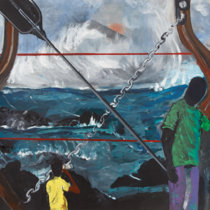Every three or four years, a musician appears in Brazil who manages to reinvent the codes of Brazilian popular music. To rework Bossa Nova, Forro, Samba and foreign influences, in an original way that produces a new sound.
Such is the case of Caxtrinho, aka Paulo Vitor Castro, 25, with his first offering entitled Queda Livre (Free Falling). In ten songs and twenty-nine minutes, the prodigy is accomplished.
From the very first track, Cria de Bel, a tremulous, deconstructed Bossa Nova tune, with dissonant guitars and lots of cuica – a rather lilting percussion instrument – plunges us into a very strange, if unmistakably Brazilian, universe.
Caxtrinho grew up in Baixada Fluminense, a remote suburb of Rio de Janeiro where three million people live in rampant poverty. Although only 25 kilometers from Copacabana and Ipanema, this agglomeration is light-years away from affluent neighborhoods.
Queda Livre is dense, intense and chaotic, just like the Baixana Fluminense. At times, beauty appears, in the form of a tiny accoustic samba, or harmonic vocals.Then anguish returns, in the form of delirious brass, furious keyboards, psychedelic guitars and pulsating drums.
The last two tracks, Merecedores and Rolé Na B2, are the longest and most innovative. Behind these moments of intensity, there is something very well constructed. Caxtrinho seems to know perfectly well where he wants to take us, i.e., into the complicated universe where he grew up, in which the vast majority strive to survive until tomorrow, hoping not to succumb to stray bullets in the wrong place at the wrong time.
Queda Livre is not an album to be listened to on mute at a gathering of friends. It’s an album to be listened to alone, or among connoisseurs, to feel this tropical musical downpour.
Thirty minutes isn’t much for a first album. We’ll see later if Queda Livre is an accident or the start of an innovative career. Caxtrinho is definitely one to watch.
























